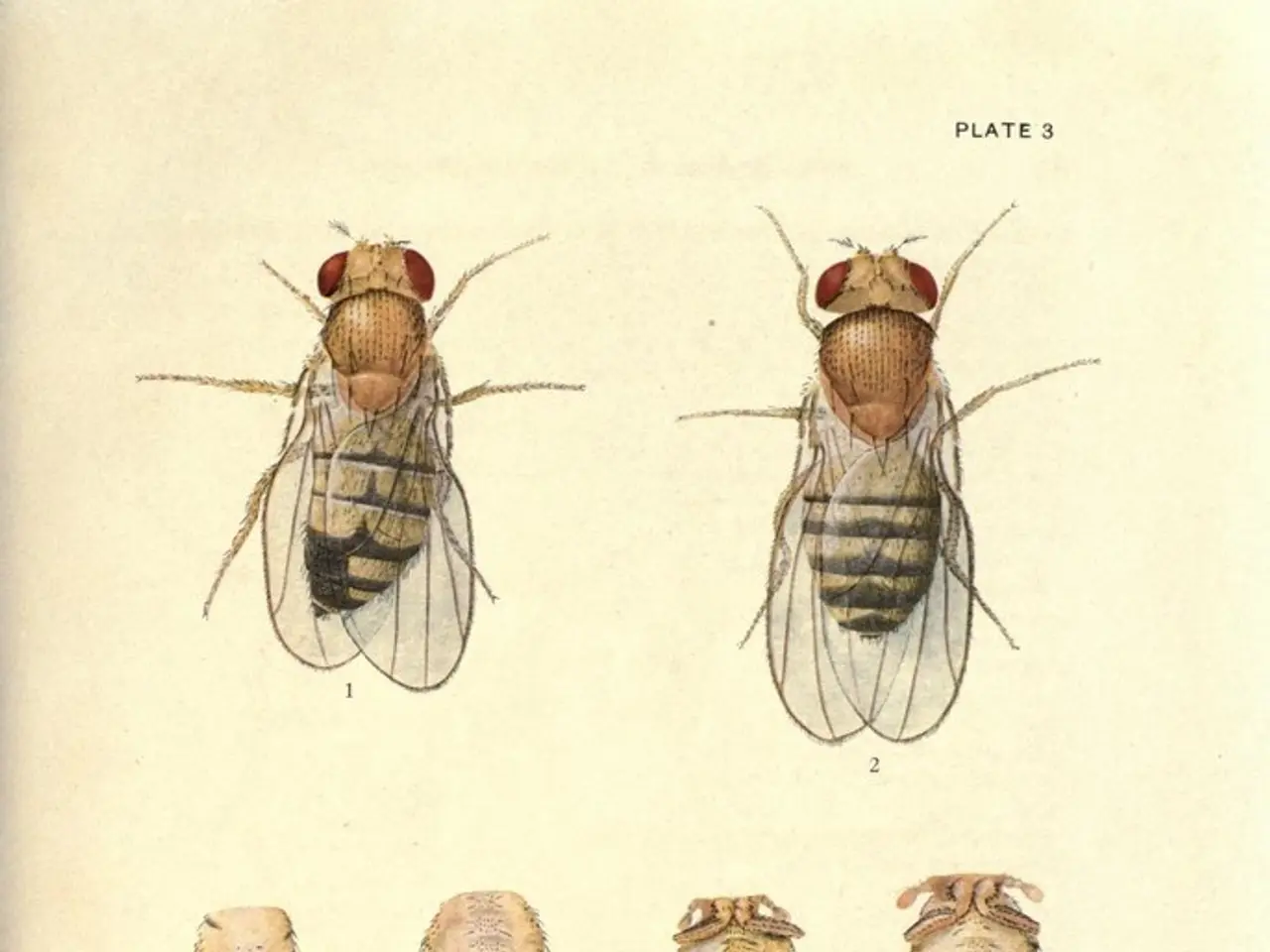Thousands of Chikungunya Disease Cases Confirmed in China: Symptoms, Risk Factors, Potential Complications Explored
In the fight against Chikungunya, a mosquito-borne virus, the key lies in reducing the risk of mosquito bites. The Aedes species, particularly, are carriers of the virus. Here's a guide on effective prevention methods to help you stay protected.
Prevention Methods
- Eliminate Mosquito Breeding Sites: Regularly clean and eliminate standing water around homes and public areas. This includes checking for stagnant water in flowerpots, buckets, and tyres. Using mosquito nets or screens on windows and doors can also prevent entry of these pesky insects.
- Use Protective Gear: Dress appropriately when outdoors. Wear long-sleeved shirts, long pants, and socks. Footwear is important too; opt for closed shoes instead of sandals or flip-flops.
- Apply Insect Repellent: Insect repellents containing DEET, picaridin, or IR3535 are effective. Apply repellents to exposed skin and clothing for added protection.
- Install Mosquito Nets: Use mosquito nets when sleeping outdoors or in areas without screens. This simple measure can significantly reduce the risk of mosquito bites.
- Use Air Conditioning: Keeping homes cool with air conditioning can help reduce mosquito activity.
- Avoid Peak Mosquito Hours: Limit outdoor activities during peak mosquito hours (dawn and dusk). This can help reduce the chances of being bitten by mosquitoes.
- Community Measures: Participate in community efforts to control mosquito populations. This could involve regular clean-ups, community spraying of insecticides, and educating others about the importance of prevention.
- Public Health Measures: Support public health initiatives aimed at reducing mosquito populations and monitoring disease outbreaks. This includes reporting any suspected cases to local health authorities.
By following these prevention methods, individuals can significantly reduce their risk of being infected with Chikungunya.
Background
Urban outbreaks of Chikungunya were first recorded in Thailand in 1967 and in India in the 1970s. Symptoms of the virus typically last for 2-3 days and include fever, joint pain, muscle pain, headache, nausea, fatigue, and rash.
Currently, there are two Chikungunya vaccines available in the United States: IXCHIQ and VIMKUNYA. The Chikungunya virus was first identified in the United Republic of Tanzania in 1952 and has since been found in other countries in Africa and Asia.
Though Chikungunya is rarely fatal, the elderly, newborns, and individuals with pre-existing health conditions are at a higher risk of severe complications. Chikungunya prevention methods are crucial in reducing the spread of the virus and keeping communities safe.
- Promote Workplace-Wellness Programs: Encourage workplaces to implement health and wellness programs that educate employees about Chikungunya and other infectious diseases, as well as providing resources for preventive measures.
- Regular Health Check-ups: Schedule regular medical check-ups to identify and manage any medical conditions that may increase the risk of complications from Chikungunya.
- Chronic Disease Management: Those with chronic diseases, such as diabetes or autoimmune disorders, should pay extra attention to Chikungunya prevention due to a higher risk of severe complications.
- Cancer Patients: Individuals undergoing treatments for cancer may be at a higher risk of contracts Chikungunya, as their immune systems are compromised. Consult with healthcare providers to discuss specific preventive measures.
- Respiratory and Digestive Health: Maintain overall health by managing respiratory conditions like asthma and digestive health issues. Good health is essential for a strong immune system and the ability to effectively fight off Chikungunya if infected.
- Eye, Hearing, and Skin Health: Regular check-ups with healthcare professionals can help manage any eye, hearing, or skin conditions that may require special attention during Chikungunya prevention efforts.
- Mental Health: A healthy mental state is essential for overall well-being. Manage stress, anxiety, and other mental health issues through therapies and treatments, as these can weaken the immune system and increase the risk of Chikungunya complications.
- Men's Health: Encourage men to take an active role in their health by regularly seeking medical care, managing chronic conditions, and maintaining a healthy lifestyle for improved Chikungunya prevention.
- Women's Health: Women, particularly those who are pregnant or breastfeeding, should pay extra attention to Chikungunya prevention due to the potential risks to the mother and developing baby.
- Parenting: Educate children about the risks of Chikungunya and teach them the importance of preventive measures to protect themselves and others.
- Weight Management: Maintain a healthy weight to reduce the risk of Chikungunya complications and other health problems.
- Cardiovascular Health: Maintaining a healthy cardiovascular system is important for overall health, as a strong heart can help the body better fight off Chikungunya.
- Fitness and Exercise: Regular exercise can boost the immune system and help the body fight off Chikungunya if infected.
- Sexual Health: Safe sexual practices can help prevent the spread of sexually transmitted infections that may compromise the immune system and increase the risk of Chikungunya complications.
- Energy Efficiency: In light of climate change, promoting energy-efficient manufacturing processes can reduce the emission of greenhouse gases, creating a healthier environment.
- Financial Planning: With a focus on Health and Wellness, individuals and small businesses should consider financial planning for medical emergencies and healthcare costs that may arise from Chikungunya or other health issues.
- Education: Encourage universities and educational institutions to incorporate environmental science, finance, and health topics in their curriculums to inspire the next generation of leaders in these fields.
- Entrepreneurship in Healthcare: Support aspiring entrepreneurs in the healthcare sector by providing resources, funding, and mentorship for ventures focused on improving health and illness prevention.
- Climate-Change Policy: Advocate for policies that address climate change and promote sustainability in industries such as transportation, retail, and energy, to reduce the environmental factors contributing to mosquito populations and the spread of Chikungunya.




